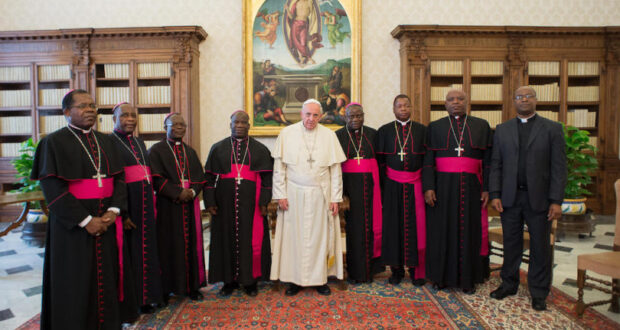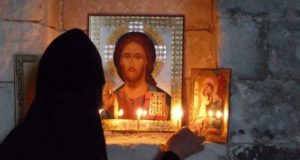Emily Mangiaracina – أوضح أساقفة مالاوي أن “البركات من أي نوع، وللارتباطات بين نفس الجنس من أي نوع” غير مسموح بها، وذلك تماشياً مع التعاليم الكاثوليكية غير القابلة للتغيير بأن الكنيسة لا يمكنها أن تبارك العلاقات الخاطئة.
أصدر المؤتمر الأسقفي في ملاوي توجيهًا يوم الثلاثاء يحظر مباركة العلاقات المثلية في أعقاب الارتباك بشأن إعلان الفاتيكان الذي يسمح بمباركة “للأزواج من نفس الجنس”.
ينص الإعلان الرسمي الصادر عن مؤتمر أساقفة ملاوي على أنه “لتجنب خلق ارتباك بين المؤمنين، فإننا نوجه بأنه لأسباب رعوية، لا يُسمح بالبركات من أي نوع أو الاتحادات من نفس الجنس من أي نوع في ملاوي”.
في يوم الاثنين الموافق 18 ديسمبر/كانون الأول، أصدر البابا فرانسيس والكاردينال فيكتور مانويل فرنانديز Fiducia Supplicans، الذي يسمح “بركات للأزواج الذين يعيشون في أوضاع غير قانونية وللأزواج من نفس الجنس” في تناقض مع التعاليم الكاثوليكية غير القابلة للتغيير بأن الكنيسة لا تستطيع أن تبارك العلاقات الخاطئة.
وبينما يوضح فرنانديز في الوثيقة أن مثل هذه البركات لا يجب أن تفسر على أنها بركات “مناسبة لسر الزواج”، فإنه يعترف بأن “التأمل اللاهوتي للنص، المبني على الرؤية الرعوية للبابا فرانسيس، ينطوي على تطور حقيقي عما كان عليه الحال في السابق”. قيل عن البركات في السلطة التعليمية والنصوص الرسمية للكنيسة.
في عام 2021، ذكر CDF بوضوح أن الكنيسة ليس لديها “السلطة لمنح البركة لاتحاد الأشخاص من نفس الجنس”.
ذكر CDF أنه “لا يجوز منح البركة على العلاقات أو الشراكات، حتى المستقرة، التي تنطوي على نشاط جنسي خارج إطار الزواج (أي خارج الاتحاد الذي لا ينفصم بين رجل وامرأة ومنفتح في حد ذاته على نقل الحياة”)، كما هو الحال في حالات الاتحاد بين الأشخاص من نفس الجنس.
في حين أكد المؤتمر الأسقفي في ملاوي أن Fiducia Supplicans “لا يتعلق بمباركة الاتحادات من نفس الجنس” بل بمباركة الأفراد “بغض النظر عن دولتهم”، أكد فرنانديز في إعلان الفاتيكان أن البركات التي يتناولها تنتقل إلى العلاقات في خاص.
في الفقرة 31 من النص، كتب فرنانديز ما يلي:
ضمن الأفق الموضح هنا، هناك إمكانية بركات الأزواج في أوضاع غير منتظمة والأزواج المثليين، والتي لا ينبغي أن يجد شكلها أي تثبيت طقسي من جانب السلطات الكنسية، حتى لا يحدث ارتباك مع البركة الخاصة بهم. سر الزواج.
في هذه الحالات، يتم منح البركة ليس فقط ذات قيمة تصاعدية، ولكنها أيضًا استحضار بركة نازلة من الله نفسه على أولئك الذين، مدركين أنهم معوزون وبحاجة إلى مساعدته، ولا يطالبون بشرعية وضعهم الخاص. ولكن توسلوا أن يتم استثمار كل ما هو حقيقي وصالح وصالح إنسانيًا في حياتهم وعلاقاتهم وشفاءه ورفعه بحضور الروح القدس.
تعبر أشكال البركة هذه عن دعاء إلى الله أن يمنح تلك المعونات التي تأتي من نبضات روحه – ما يسميه اللاهوت الكلاسيكي “النعم الحاضرة” – حتى تنضج العلاقات البشرية وتنمو في الأمانة لرسالة الإنجيل، وتحرر نفسها من ضغوطها. العيوب والضعف، ويعبرون عن أنفسهم في البعد المتزايد للحب الإلهي.
إن اقتراح فرنانديز بأن هناك “خير” في العلاقات المثلية يتحدى أيضًا حقيقة مثل هذه العلاقات باعتبارها خطيئة أخلاقية خطيرة.
في رسالته الأولى إلى أهل كورنثوس، يؤكد القديس بولس أن الأفعال المثلية خطيئة، موضحًا أنه “لا الزناة ولا عبدة الأوثان ولا مضاجعو الذكور يرثون ملكوت الله”، بل بحسب رسالته إلى أهل رومية: أولئك الذين يمارسون المثلية الجنسية سينالون “في أنفسهم الجزاء المستحق لخطئهم”.
Malawi bishops forbid ‘blessings’ of homosexual unions amid confusion over Vatican document
Emily Mangiaracina – Malawi’s bishops have clarified that ‘blessings of any kind and for same sex unions of any kind’ are not permitted, in line with unchangeable Catholic teaching that the Church cannot bless sinful relationships.
The Episcopal Conference of Malawi issued a directive on Tuesday forbidding the blessing of same-sex unions in the wake of confusion over a Vatican declaration allowing blessings “for couples of the same sex.”
n official declaration by the Malawi bishops’ conference states that “to avoid creating confusion among the faithful we direct that for pastoral reasons, blessings of any kind and for same sex unions of any kind, are not permitted in Malawi.”
On Monday, December 18, Pope Francis and Cardinal Victor Manuel Fernández issued Fiducia Supplicans, which allows “blessings for couples in irregular situations and for couples of the same sex” in contradiction to the unchangeable Catholic teaching that the Church cannot bless sinful relationships.
While Fernández makes clear in the document that such blessings must not be construed as blessings “proper to the sacrament of marriage,” he admits that the text’s “theological reflection, based on the pastoral vision of Pope Francis, implies a real development from what has been said about blessings in the Magisterium and the official texts of the Church.”
In 2021, the CDF stated clearly that the Church does not have the “power to give the blessing to unions of persons of the same sex.”
The CDF stated that it is “not licit to impart a blessing on relationships, or partnerships, even stable, that involve sexual activity outside of marriage (i.e., outside the indissoluble union of a man and a woman open in itself to the transmission of life), as is the case of the unions between persons of the same sex.”
While the Episcopal Conference of Malawi stressed that Fiducia Supplicans is “NOT about the blessing of same sex unions” but rather the blessings of individuals “regardless of their state,” Fernandez emphasized in the Vatican declaration that the blessings he addresses are imparted to relationships in particular.
In paragraph 31 of the text, Fernández writes that:
Within the horizon outlined here is the possibility of blessings of couples in irregular situations and of same-sex couples, the form of which should not find any ritual fixation on the part of ecclesial authorities, in order not to produce confusion with the blessing proper to the sacrament of marriage.
In these cases, a blessing is imparted that not only has ascending value but is also the invocation of a descending blessing from God Himself on those who, recognizing themselves to be destitute and in need of His help, do not claim legitimacy of their own status, but beg that all that is true, good, and humanly valid in their lives and relationships be invested, healed and elevated by the presence of the Holy Spirit.
These forms of blessing express a supplication to God to grant those aids that come from the impulses of His Spirit – what classical theology calls ‘present graces’ – so that human relationships may mature and grow in fidelity to the Gospel message, free themselves from their imperfections and frailties, and express themselves in the ever-increasing dimension of divine love.
Fernández’s suggestion that there is “good” in same-sex relationships also defies the reality of such relationships as gravely morally sinful.
In his first letter to the Corinthians, St. Paul states that homosexual actions are sinful, explaining that “neither fornicators, nor idolaters, nor adulterers” will “inherit the kingdom of God,” but rather, according to his letter to the Romans, those who practice homosexuality will receive “in their own persons the due penalty for their error.”
 Agoraleaks Agoraleaks
Agoraleaks Agoraleaks







